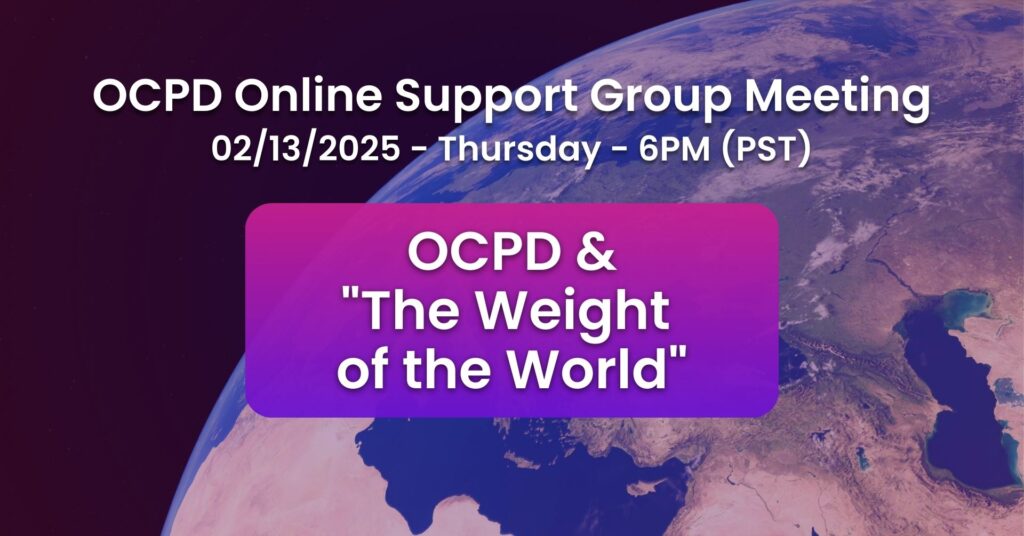When does our concern for world events become counterproductive? Does preoccupation with the suffering of people portrayed in the news made it harder to recognize the suffering of people in our lives, and our own suffering?
As I was preparing for this topic two relevant pieces of content serendipitously crossed my digital feed and I thought they succinctly encapsulated our struggle as modern humans living in a globally connected period of time. The first piece from Therapy Jeff helps illustrate the difference between our “Sphere of Concern” and “Sphere of Influence” (aka understanding what is within our control and what is not).
The second piece focuses specifically on our relationship to news consumption.
While struggling with “the weight of the world” is clearly a shared human experience, there are some obvious ways that our OCPD traits further amplify and exacerbate our own suffering. This becomes clear when presented with just a few choice lines pulled from the OCPD wikipedia entry:
- People with OCPD tend to be obsessed with controlling their environments.
- Individuals with OCPD are overconscientious, scrupulous and rigid, and inflexible on matters of morality, ethics and other areas of life. They may force themselves and others to follow rigid moral principles and strict standards of performance.
- Their view of the world is polarised and dichotomous; there is no grey area between what is right and what is wrong. Whenever this dichotomous view of the world cannot be applied to a situation, this causes internal conflict as the person’s perfectionist tendencies are challenged.
- People with this disorder are so obsessed with doing everything the “right and correct” way that they have a hard time understanding and appreciating the ideas, beliefs, and values of other people, and are reluctant to change their views, especially on matters of morality and politics.
Our Sphere of Concern can be all-encompassing and, thanks to the egosyntonic nature of our disorder, we most like believe our way of operating is the correct response to the state of the world. We can justify and present out moral outrage and empathy as the most virtuous, pious, or even rational responses. So we personally take on and internalize every injustice that enters our awareness and then struggle to exert control and influence over them to affect positive change. From a certain vantage point, it’s truly valiant and admirable effort. But what is the cost, the impact on our bodies and psyches over the span of our lives? Are our coping mechanisms and responses sustainable long-term and serving us well or are there possibly healthier responses we might consider?
As Therapy Jeff mentions in the first post, we have to recognize the reality that there are limits to our sphere of influence and control. What does accepting that truth bring up in us that we might be avoiding and unwilling to admit or confront? How do we process our human limitations and fragility more broadly? Are there painful, unwanted emotions that come up when we think about this? Are their beliefs and expectations that we’re holding that might require reexamination and modification?
When is our sphere of concern taking over? It requires some degree of mindfulness to pause and assess whether we’re inundating ourselves with more content than we have the means or intention of taking action on. As a chronic overthinker, I’ve found that focusing on what I actually have the capacity to action on has been critical for me. It’s entirely too easy to consume beyond my capacity to healthily digest and act on.
“The world doesn’t need your guilt and exhaustion. It needs your energy, your presence, and your ability to actually do something.”
– Therapy Jeff
Reflection Questions
- What specific responsibilities or expectations feel the heaviest right now, and why do they matter so much to me?
- What values or goals am I holding onto that may no longer serve me, and what would it feel like to release them?
- How can I reframe my sense of responsibility so that it empowers me rather than weighs me down?
- What would it look like resize my sphere of concern?
- What are some ways I can be more intentional about my sphere of influence and the actions I take?
- How do I define success and failure, and is my definition realistic or self-imposed?
- Who in my life provides balance and perspective when I feel overwhelmed, and how can I learn from them?

![[Zoom Meeting] OCPD & Disgust 🤢](https://www.youmeandocpd.com/wp-content/uploads/2023/12/2023-12-14-OCPD-Disgust-1024x536.jpg)
![[Zoom Meeting] Reflecting on the Year 2023 📝🔍](https://www.youmeandocpd.com/wp-content/uploads/2023/12/2023-12-28-OCPD-Reflecting-on-the-Year-1024x536.jpg)